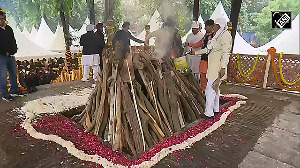 Mumbai's 26/11 has all the makings of a watershed in world history. As a fallout, the United States is reportedly using its unmatched diplomatic clout to get the United Nations to brand four people as terrorists.
Mumbai's 26/11 has all the makings of a watershed in world history. As a fallout, the United States is reportedly using its unmatched diplomatic clout to get the United Nations to brand four people as terrorists.
And, surprise, surprise, all the four have links to Pakistan's dreaded spy agency, the Inter-Services Intelligence directorate.
One of them, pictured alongside, is retired Lieutenant General Hamid Gul, a former ISI chief whose name has over the years been associated to terrorist activity in the world in general and South Asia in particular. From instigating violence in Kashmir to warning Osama bin Laden of an impending US missile strike to former Pakistan prime minister Benazir Bhutto's assassination, Gul's name has cropped up in all the wrong places.
Just why is the general considered among the most dangerous men in the world?
Originally from Sarghoda in Pakistani Punjab, he was General Zia-ul Haq's blue-eyed boy; the then Pakistan dictator nominated Gul ISI chief in March 1987. Gul was apparently no slouch in battle; he is a winner of the Sitara e Jurat, Islamabad's third highest military honour, awarded to him for his services in the 1965 war with India.
Before he became the ISI's boss, Gul was one of the biggest supporters of -- and a Central Intelligence Agency collaborator in -- the long Afghan struggle against the erstwhile Soviet Union. Probably because of that, then CIA station chief Milt Bearden viewed him as a US ally. Bearden, in a book he co-authored, The Main Enemy: The Inside Story of the CIA's Final Showdown with the KGB, later admitted that Gul eventually turned against America.
Why does he matter to India?
Gul is credited with being the brain behind Pakistan's proxy wars with India, first in the Punjab, and then in Kashmir. He is referred to as a godfather of the terrorist group Lashkar-e-Tayiba, which India believes carried out 26/11 and numerous other terror attacks in India.
According to counter-terrorism expert B Raman, Gul told Benazir Bhutto when she became prime minister: 'Madam, keeping Punjab destabilised is equivalent to the Pakistan army having an extra division at no cost to the taxpayers.'
The Washington Post reported earlier this week in the 26/11 aftermath, Gul is among the people that India wants Pakistan to hand over.
The never-short-of-a-harsh-retort general dismissed the latest allegations in conversation with The Washington Post: 'They (India) are saying these boys were village boys trained to be killers. How can this be believed? Village boys don't know anything about a 5-star hotel. They would not know how to use the toilet.'
Why does he matter to the US?
Gul is also called the godfather of the Taliban. He denies that charge too.
He told rediff.com's Sheela Bhatt in an earlier interview: "You can't create the Taliban, it was a spontaneous body."
He said he "didn't create the Taliban. This is an Ahmed Rashid (journalist and author of a book on the Taliban) saying. I was a friend of (Gulbuddin) Hekmatyar, (Burhanuddin) Rabbani and many Northern Alliance leaders like (assassinated Northern Alliance leader) Ahmed Shah Masood. I was trying to broker peace between them in my individual capacity. They are wonderful people but very difficult to deal with."
In August 2003, Gul was quoted as saying, 'The Muslim world must stand united to confront the US in its so-called war against terror which is in reality a war against Muslims. Let's destroy America wherever its troops are trapped.'
But there are many anti-American individuals in the Islamic world. What's special about Gul?
Gul is believed to be the man who tipped off bin Laden in August 1998 that the US was tracking the Saudi's satellite phone to launch a missile attack on him. Counter-terrorism expert and former US government adviser Richard Clarke later told The New Yorker: 'I have reason to believe that a retired head of the ISI was able to pass information along to Al Qaeda that an attack was coming.'
Gul was also part of the Ummah Tameer-e-Nau, a charity for the reconstruction of Afghanistan that was later alleged to have planned to give bin Laden and Al Qaeda the know-how to make a nuclear bomb.
In 2004, sections of the US media was also abuzz that Gul was 'bin Laden's master planner' in the 9/11 plot.
Gul, on his part, maintains 9/11 is America's own creation. He told Sheela Bhatt: "To slap sanctions on Afghanistan they (the US) started spreading baseless allegations against Osama (bin Laden)."
So, what happens to Gul now?
As evidenced by his advanced knowledge of the missile strike on bin Laden, the man has friends in very high places. And he has survived much longer than the people he once served -- like Benazir Bhutto (who accused him of trying to kill her), Zia-ul Haq. Gul is hale and hearty though a former protege, a man who goes by the name of Pervez Musharraf, has been buried on the outskirts of relevance.
Like all spymasters Gul knows secrets too deep, too buried in the haze and maze of the Afghanistan-Pakistan border. If India can smoke him out, it will be a major triumph. But that seems highly unlikely. The general is much too powerful for the Pakistan army to agree to its extradition.






 © 2024 Rediff.com -
© 2024 Rediff.com -